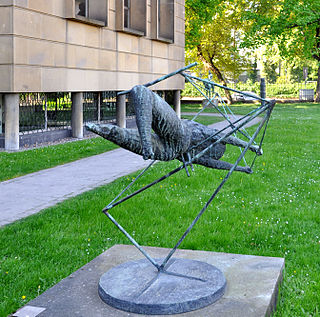A Quote by John Ruskin
So long as we see the stones and joints, and are not deceived as to the points of support in any piece of architecture, we may rather praise than regret the dexterous artifices which compel us to feel as if there were fibre in its shafts and life in its branches.
Related Quotes
The world that I should wish to see would be one freed from the virulence of group hostilities and capable of realizing that happiness for all is to be derived rather from co-operation than from strife. I should wish to see a world in which education aimed at mental freedom rather than imprisoning the minds of the young in rigid armor of dogma calculated to protect them through life against the shafts of impartial evidence.
I think each village was meant to feel pity for its own sick and poor whom it can help and I doubt if it is the duty of any private person to fix his mind on ills which he cannot help. This may even become an escape from the works of charity we really can do to those we know. God may call any one of us to respond to some far away problem or support those who have been so called. But we are finite and he will not call us everywhere or to support every worthy cause. And real needs are not far from us.
However we may flatter ourselves to the contrary, our friends think no higher of us than the world do. They see us through the jaundiced or distrustful eyes of others. They may know better, but their feelings are governed by popular prejudice. Nay, they are more shy of us (when under a cloud) than even strangers; for we involve them in a common disgrace, or compel them to embroil themselves in continual quarrels and disputes in our defense.
Universities were not meant entirely, or even chiefly, as stepping-stones to an examination, but that there is something else which universities can teach and ought to teach-nay, which I feel quite sure they were originally meant to teach-something that may not have a marketable value before a Board of Examiners, but which has a permanent value for the whole of our life, and that is a real interest in our work, and, more than that, a love of our work, and, more than that, a true joy and happiness in our work.
A soft, easy life is not worth living, if it impairs the fibre of brain and heart and muscle. We must dare to be great; and we must realize that greatness is the fruit of toil and sacrifice and high courage... For us is the life of action, of strenuous performance of duty; let us live in the harness, striving mightily; let us rather run the risk of wearing out than rusting out.
The life we live today - the environment in which we live - is not one of security - it's one of doubt, one of suspicion, one of absolute tension - we're not a pastoral society any more. We feel around us the pressure of man's inadequacy to control his own development. The time when the great forces of nature, the stones and the rocks, were the gods, is gone.
Young children are unlikely to have their self-esteem strengthened from excessive praise or flattery. On the contrary, it may raise some doubts in children; many children can see through flattery and may even dismiss an adult who heaps on praise as a poor source of support-one who is not very believable.
There may be a time in life when one is tired of everything and feels as if all one does is wrong, and there maybe some truth in it- do you think this is a feeling one must try to forget and to banish, or is it 'the longing for God,' which one must not fear, but cherish to see if it may bring us some good? Is it 'the longing for God' which leads us to make a choice which we never regret? Let us keep courage and try to be patient and gentle. And not mind being eccentric, and make distinction between good and evil.
God grant that each of us here today may so live that all among us, and with us, may see, not us, but that which is divine and comes from God. With that vision of what those who have lost their way may become, my prayer is that they may receive strength and resolution to climb higher and higher and upward and onward to that great goal of eternal life and also that I may do my part in seeking to show by example, as well as by precept, that which will be the best of which I am capable of doing.




































